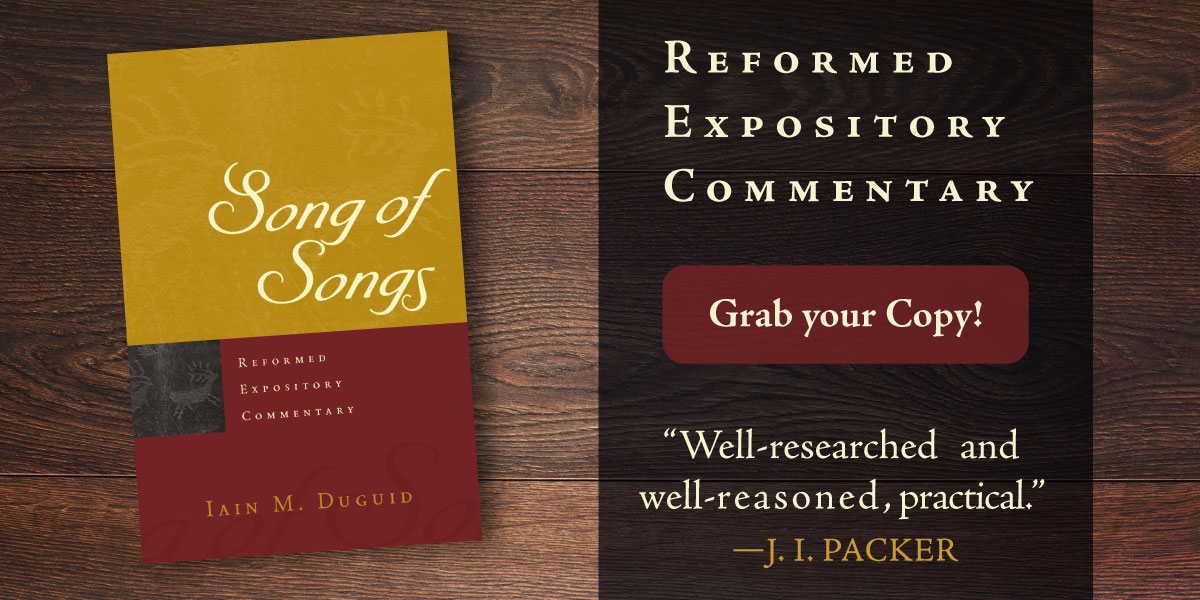Written by Iain Duguid: Song of Songs (Reformed Expository Commentary)
Is Solomon the hero of the song?
Many fine commentators think so, both among those who follow the allegorical or typological model and among those who follow the literal model. The opening superscription might seem to point clearly in that direction. [1] Isn’t the greatest Davidic king the ideal person to speak about love and marriage, and thus foreshadow Christ? But that identification seems difficult to reconcile with the historical Solomon that we know from the rest of the Bible—a famous collector of a thousand wives and concubines (1 Kings 11:3). He hardly seems like a model of an exclusive, lifelong, “till death do us part” marriage relationship, the kind extolled in the Song!
Even if Solomon wrote the book to a particular woman when he was young, before he married all his other wives, his subsequent life story would surely undercut the Song’s teaching. What would we say about someone who gave a wonderful testimony in church about his true love for his bride—and then later repeatedly betrayed her trust? Would we keep that testimony prominently posted on our church website, even if everything he had said about love and marriage were true?
Similar difficulties attend the view that Solomon wrote the Song later in life as an act of repentance. That might work if he wrote it about someone else, but it would hardly be an act of repentance to speak about the wonderful love he had shared with his one and only true love while omitting any mention of his own long subsequent history of serial adultery. People can certainly teach us how to do things that they themselves have not done very well, but if they pretend that they did them perfectly themselves when they didn’t, that is a problem.
There are other issues with seeing the hero of the Song as Solomon. If Solomon is the hero of the Song, how would the Shulammite’s love for her man illustrate the theme that is so central to chapter 8, that true love cannot be bought for any price? When someone is about to marry one of the richest men in the world, allow me to be skeptical of the purity of her motives. This is like Elizabeth Bennet in Pride and Prejudice suddenly deciding that perhaps Mr. Darcy isn’t so sullen and proud, immediately after she sees his gorgeous estate in Derbyshire! Moreover, if Solomon wrote the Song of Songs about himself, then the wonderful description of the man’s appearance in 5:10–16 seems an embarrassingly laudatory self-portrait.
Some commentators have therefore imagined that the Song depicts a three-cornered love triangle between Solomon, the woman, and her shepherd-boy lover. In this approach, Solomon has carried the woman off to his harem, but she pines for (and in some cases actually pursues) her true love. Yet this view requires abrupt transitions in the poems from one subject to another, not to mention raising acute moral and ethical questions about a woman who is married to one man (however unwillingly) and actively pursuing a love relationship with someone else.
For these reasons, I take the Song of Songs to be a poem by an unknown and anonymous author about two idealized people, a man and a woman, whose exclusive and committed love is great but, like all loves in this fallen world, far from perfect. As we will see, their idealized love story is actually contrasted in the Song with the alternative Solomonic model of “love,” clearly displayed in 1 Kings 11. This Solomonic model identifies love as a commercial and political transaction, serving as a means to some other end, whether wealth, political advantage, security, or significance.
Thus, the Song is designed to show each of us how far short of perfection we fall, both as humans and as lovers, and to drive us into the arms of our true heavenly Husband, Jesus Christ, whose love for his bride is truly perfect. Solomon is thus a foil for the main character, not the main character himself.
Ready for more? Check out our practical yet thorough commentary on the Song of Songs. Use for personal or group studies!
[1] The evidence, however, is not as clear as it might superficially seem. In Hebrew, the superscription actually deviates markedly from the normal ascription of authorship seen in the Psalms, suggesting a more complex relationship between Solomon and the Song. For a fuller discussion, see Duguid, The Song of Songs, 73–76.
About the Author
 Iain M. Duguid (PhD, University of Cambridge) is professor of Old Testament at Westminster Theological Seminary, Philadelphia. He has written numerous works of biblical exposition, including Esther & Ruth in the Reformed Expository Commentary series, Ezekiel in the NIV Application Commentary series, and Numbers in the Preaching the Word series.
Iain M. Duguid (PhD, University of Cambridge) is professor of Old Testament at Westminster Theological Seminary, Philadelphia. He has written numerous works of biblical exposition, including Esther & Ruth in the Reformed Expository Commentary series, Ezekiel in the NIV Application Commentary series, and Numbers in the Preaching the Word series.



The 4 Most Popular Ways To Read The Song Of Songs
-[…] See also: who wrote the Song of Songs and how this affects the way we read the book! […]
Is Solomon the Hero of the Song? - Westminster Theological SeminaryWestminster Theological Seminary
-[…] . . . Continue reading at P&R Publishing. […]